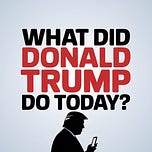Donald Trump’s recent statements and executive actions highlight his characteristic mix of personal grievance, transactional diplomacy, and ideological messaging, often at the expense of legal precedent, policy coherence, and diplomatic integrity.
On Ukraine, Trump echoed Kremlin talking points by dismissing Ukraine’s claim to Crimea and blaming President Zelenskyy for obstructing peace. His rhetoric falsely characterized Russia’s 2014 annexation of Crimea as an “Obama handover,” ignoring international law and the military realities of the conflict. Trump’s framing rewards aggression and misrepresents Ukraine’s right to sovereignty, positioning capitulation rather than Russian withdrawal as the path to peace.
The White House Initiative on HBCUs, while packaged as support for Historically Black Colleges and Universities, offers largely symbolic promises without enforceable goals, funding commitments, or clear accountability. The initiative emphasizes private-sector involvement over stable public investment and dismantles existing advisory structures, raising concerns about politicization and superficial engagement with these institutions.
A series of executive orders signed by Trump—targeting civil rights enforcement, accreditation standards, DEI policies, and education—reflect an ideologically driven campaign against what the administration terms “discriminatory equity ideology.” These orders attempt to roll back decades of civil rights protections, including disparate-impact liability under Title VI, likely inviting significant legal challenges. While one order on AI education and skilled trades presents more pragmatic goals, even this effort suffers from the administration’s broader preference for deregulation over meaningful investment.
Trump’s remarks during the executive order signings were disjointed and marked by cultural grievance rather than substantive policy explanation. His meandering commentary blended personal anecdotes with policy announcements, undermining the seriousness of the event and providing little clarity on implementation or accountability.
In economic policy, a lawsuit by twelve states challenges Trump’s tariff strategy, arguing that he unlawfully invoked emergency powers under the International Emergency Economic Powers Act without legitimate justification. The states contend that Trump’s tariff policies bypass congressional authority, destabilize the economy, and amount to an arbitrary use of executive power.
Overall, these developments illustrate Trump’s continued use of executive action as a platform for political theater and ideological posturing rather than thoughtful governance. His policies exhibit legal overreach, lack substantive policy frameworks, and risk exacerbating polarization and instability both domestically and abroad.













Share this post